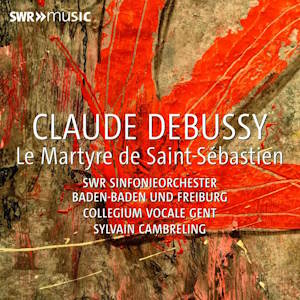
Claude Debussy (1862-1918)
Le Martyre de Saint Sébastien (1911)
Heidi Grant Murphy (soprano), Dorte Lyssewski (narrator), Dagmar Peckova (mezzo-soprano), Nathalie Stutzmann (alto)
Collegium Vocale Gent, South West German Radio Symphony Orchestra, Baden-Baden/Sylvain Cambreling
rec. 2005, Konzerthaus Freiburg, Germany
SWR Music SWR19149CD [77]
This is a very strange work. It was the brainchild of Ida Rubinstein (1883-1960), who was a dancer and an actress, but not a singer. She commissioned it in 1910 from the Italian writer Gabriele D’Annunzio (1863-1938), who who was at the time living in France to avoid his creditors. She wanted a lavish spectacle which would involve all the arts and bring together both the Christian legend of the martyrdom and pagan ideas. She would play the saint, a spoken role. D’Annunzio responded with an enormously long play written in French in the flowery style characteristic of the decadent movement – another example would be Oscar Wilde’s Salome, also written in French. Others involved included the choreographer Michael Fokine, the painter and stage-designer Léon Bakst – and Debussy, who was commissioned to write incidental music for soloists, chorus and orchestra and also including a spoken role for the saint.
Debussy had to work fast, in the early months of 1911, so he involved André Caplet to help with the orchestration, under his direction. Nevertheless, Debussy warmed to the task and, though not a believer, found much to attract him in the ideas behind the play and he wrote an hour’s worth of music. The premiere took nearly five hours to perform. It was not a success, partly because of its enormous length but also because the Archbishop of Paris forbade Catholics from attending it, as he objected to the saint being portrayed by a Jewish woman. Rubinstein revived the work in 1922, in a shortened form, but it has never caught on and it is hard to imagine that it would ever be staged again in full.
Since then, there have been various attempts to salvage the music. Debussy made a short orchestral suite, Fragments symphoniques, which is occasionally heard. Later, the conductor Désiré-Émile Inghelbrecht, who had conducted the chorus at the premiere, devised a concert version, replacing the bulk of the play with a recitation, which in total takes no more than about fifteen minutes, but preserves all the music. Or just the music can be performed, and I attended such a performance myself many years ago ago, under Michael Tilson Thomas, which was later recorded, and to which I shall return.
Is it worth the trouble? Opinions on the music have varied. For Eric Frederick Jensen, who wrote the 2014 Master Musicians volume on the composer, ‘it is a disappointment. Much of it is clichéd and predictable – in its way a suitable counterpart to D’Annunzio’s drama.’ I am not alone in disagreeing. I find much of it wonderfully beautiful. Admittedly some of it seems to hark back to Debussy’s early cantatas L’Enfant prodigue and La Demoiselle élue, and there are also echoes of Parsifal, as there are in the interludes in Pelléas et Mélisande. The music seems none the worse for that. But as it goes on, there is a sense of a new idiom developing, one which Debussy did not live to take further. This reminds me of the Oriental impressionism of Roussel in his second period, that of the cantata Evocations and the opera-ballet Pâdmavatî. Only the final chorus seems rather conventional. Some think that Caplet composed this.
Only a real enthusiast is going to mount such a work and, with one reservation, Sylvain Cambreling does it proud. His soloists, choir and orchestra do a grand job, making the most of D’Annunzio’s rather sickly verses. However, he replaces D’Annunzio’s text with an entirely independent linking narration written by Martin Mosebach and delivered in German. This does not summarize the play but recounts aspects of the legend of the saint. The sung portions and the saint’s spoken words are in French, while the narration is in German. While I can see that this might have its advantages for a German-speaking audience, it is a distinct disadvantage for everyone else. Whatever one think of the original text, it was for this that Debussy wrote, and if a narration is to be used, I consider it should be some version of the original, and in French. Of course you can skip through it if you don’t want to hear it. I should add that the booklet contains the spoken text in German, the sung text in French and an English translation of both. The recording is fine.
This is a reissue of a recording made in 2005 which first appeared in 2010 on the Glor label. The musical parts of the performance are fine; it is only the narration which bothers me. I mentioned earlier the performance by Michael Tilson Thomas, which has only the music, with no narration. They took that into the studio in 1991, issued the following year on the Sony label, and I would encourage the curious to search out a copy of that. It includes the text and a translation. Note that most listings of this work refer to the Fragments symphoniques and not to the whole work.
Stephen Barber
Buying this recording via a link below generates revenue for MWI, which helps the site remain free




















